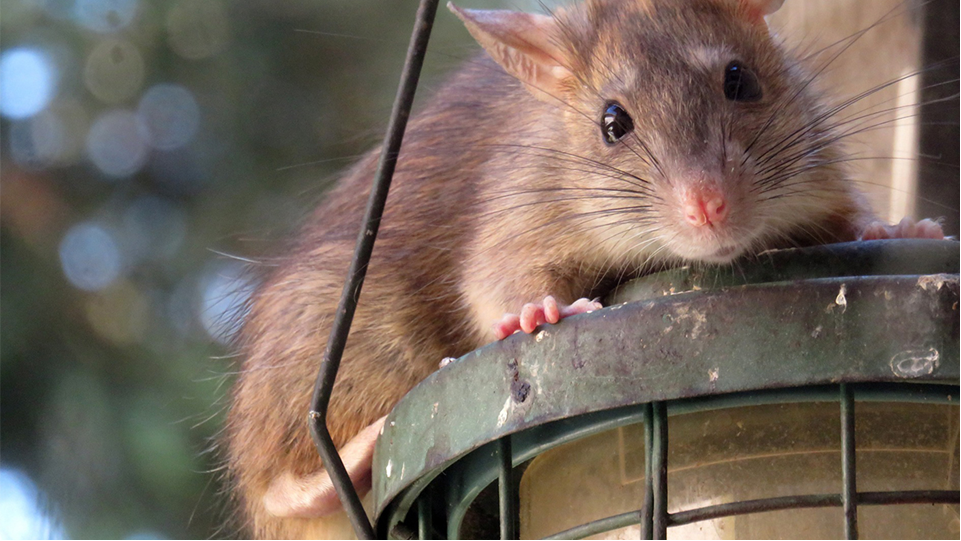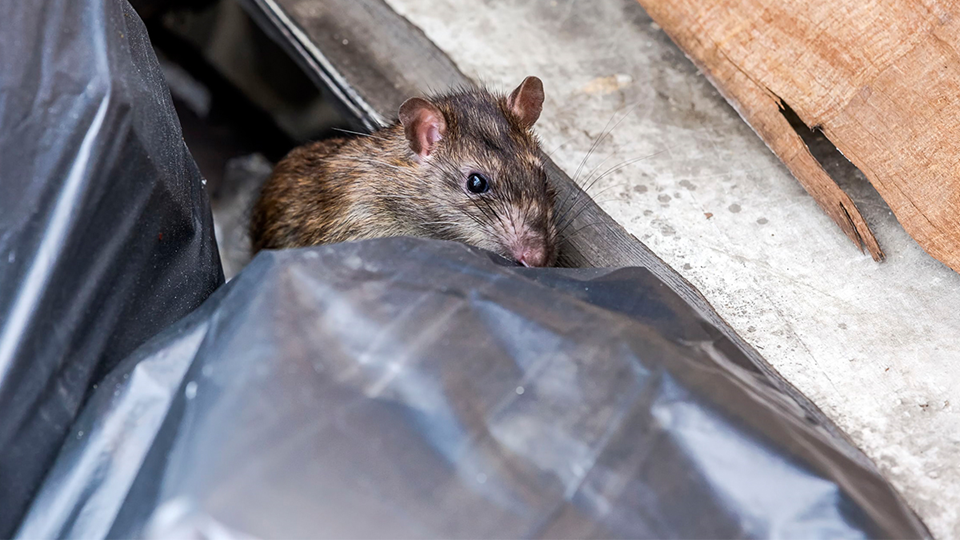Householders can put steps in place to try and avoid a rat infestation.
1. Mind the gap
Eliminate any gaps around pipes and under sheds, as rats only need a gap of 15mm to gain entry to a structure.
You will need to search for any potential entry points and seal these up with wire wool embedded in quick-setting cement.
You should focus on low level gaps first as these are the most likely areas for rats to enter. You can then consider any higher up vents or gaps.
Check around pipes and windows, and double check the basement.
Proofing all means of entry as much as possible will help to prevent an infestation
2. Tackle nesting
Remove potential nesting sites by keeping yards and gardens clean and tidy, cutting back overgrown areas and clearing any piles of wood or debris.
Compost heaps can also become nesting sites, so our advice is to protect it with wire mesh to prevent rodents digging a harbourage.
3. Think about drains
Ensure that drain inspection covers are in a good state of repair and any disused pipes are sealed off.

4. Feed birds carefully
If you feed garden birds, do not do this to excess and use a bird table or feeder basket if possible, to catch any off cast seed.
In urban areas, taking in bird feed at dusk is a way to remove an easy food supply during normal feeding time.
5. Take cover
Cover any household waste where rats can get access to it and close dustbin lids.
Recycling containers should also be washed to remove any food residue.
Lifting the lid on refuse collection
On the subject of household waste, reports of local authorities seeking to cut back bin collections regularly make the headlines.
Frequent bin collections help reduce the likelihood of rat infestations. As such, BPCA recommends local authorities do not reduce bin collections.
Here are our tips for managing waste, to prevent rat infestations.
1. Always keep lids sealed properly
Think about entry points. Even small gaps create easy access for rats – which can squeeze through a space as thin as two fingers.
2. Get broken bins replaced
Make sure any cracked or broken bins are replaced. Ask your local council for a replacement where a bin is damaged.
3. Place bins carefully
Bins offer a great platform for rats to reach new areas, so keep them away from windows and doors.
4. Don’t dump food straight into your wheelie bin
Rats are really good at sniffing out their next meal. Don’t lure them to your bin by placing loose food waste straight in the container. Instead, keep it under wraps with compostable liners, plastic bags or refuse sacks, which will help control smells and make sure it doesn’t stick to the sides of containers.
5. Look after your bins
It’s a good idea to give your indoor and outdoor bins a rinse with disinfectant and hot water. Alternatively, hire a reputable company to do it for you.
Not only will this help with the smell that attracts rats, but it’ll also mean if there are any pathogens brought in by pests, you’ll neutralise them. Always wear gloves!

BPCA recommends local authorities do not reduce bin collections because this can attract rodents
6. Don’t leave your rubbish out too early
If you don’t have wheelie bins, you may be required to move your waste to the side of the street in black sacks for collection - do so as late as possible, preferably not the night before.
7. Be careful with compost
Keep compost areas well sealed and a good distance from your property. Rats love exposed compost.
Getting rid of rats
DIY rat control
Rats are hard-wired to survive. They are adaptable, highly mobile and breed rapidly.
As a result, rat control can be an uphill task for the untrained individual.
Rats are very smart and capable of learning complex tasks, so don’t underestimate them!
However, members of the public can choose to carry out the work themselves, buying amateur-use rat poisons (rodenticides) and traps from a hardware store or garden centre.
Keep in mind that most rats are wary of new objects such as traps or poisons placed in their environment.
They will avoid them for a period before exploring them, so don’t expect instant success with this approach.
Rats are neophobic: they have a fear of new objects
Thought needs to be taken when placing poison or traps to ensure they are in a safe and secure place out of reach of non target animals, children and pets.
BPCA has a strong warning to anyone using rodenticides – always follow the instructions on the label, and importantly search for and dispose of any dead rodents in a safe manner.
When poison is consumed by a rat, it is likely that it will die in a cavity or roof space from which a bad smell can emit.
If you cannot locate the dead rodent, it may take several weeks for the body to decompose and the smell to dissipate.
Leaving these in the open can result in secondary poisoning of non target animals, such as pets or birds scavenging on the carcass.

If you think your pet has ingested poison, seek advice from a vet immediately
Although it is not recommended to tackle these pests yourself, if you decide to give it a go then you must take all necessary precautions to ensure you do not cause collateral damage or suffer personal injury.
Professional pest control
For any rat infestation, we would always recommend contacting a professional pest management company, a member of BPCA.
They are trained in rat control and will have access to a range of professional use rodenticides and tools, which are not available to the public.
Knowing how much, where, and when to deploy products is where professionals are able to take control of situations efficiently. There’s also a growing issue with resistance, due to incorrect choice of rodenticide or widespread use by members of the public.
Professional pest controllers will take an integrated pest management (IPM) approach to tackling your infestation.
A pest professional will have access to monitoring equipment, which they will use to confirm entry points into your property, the size of the infestation and to track the rat to its harbourage (nest).
They can then recommend a proofing strategy and decide on the best course of action in terms of control; this could be traps, rodenticides or a combination of both.

Great post! If you're looking for bee removal Toronto, check this out: Bee Removal Toronto.